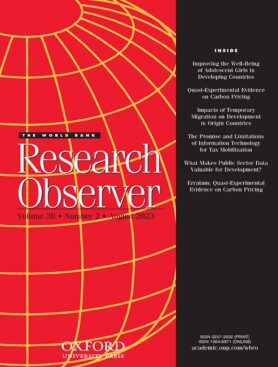The World Bank Research Observer Volume 38, Issue 2, August 2023, Pages 295–324
Tax revenue in many low- and middle-income countries is inadequate for funding investments in public goods and human capital. With high levels of informality and limited state capacity, many tax authorities have difficulty determining the true tax base and collecting taxes efficiently and equitably. Tax authorities are increasingly adopting new technologies to improve administrative processes, reduce taxpayer compliance costs, and enhance their overall effectiveness. This paper reviews the recent literature on the use of technology for tax administration. It highlights the potential of technology to improve tax collection by helping to identify the tax base, monitor compliance, and facilitate compliance. It also identifies possible limitations to the use of technology arising from inadequate infrastructure and connectivity, lack of adoption or resistance by taxpayers and tax collectors, lack of institutional mainstreaming, and an unsupportive regulatory environment.
